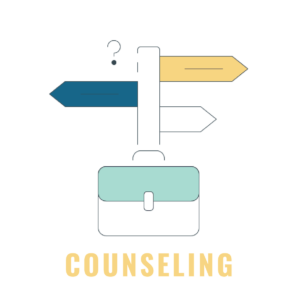
What’s the difference between “curing” and “healing” someone? It’s an interesting distinction, particularly to those who feel drawn to the field of counseling.
Pharmaceuticals can “cure” an illness, and yet without the proper support or the ability to deal with loss and trauma, an individual may be far from “healed.” It’s into that world — the one in which there’s a profound difference between a life that is “safe” and one that is truly thriving — that counselors step.
Those with counseling degrees work in a variety of settings and with almost every demographic known to man. That’s because as a society we need counselors, badly. And for the right type of person, they need to play the role of a counselor.
Is that you? Check out DegreeQuery’s coverage of what it means to be a counselor, and how to become a counselor with a counseling degree below!
General Counseling Degree FAQs
- What is the difference between a Counselor and a Therapist?
- What degree do I need to be a Holistic Counselor?
- Where can I work with a degree in Addiction Counseling?
- What are the best cities to work as a Mental Health Counselor?
- Where can I work as a Mental Health Counselor?
- What can I do with a degree in Counseling?
- What degree do I need to be a Mediator?
- What degree do I need to become a Case Manager?
- What degree do I need to become a Probation Officer?
- How do I become a Marriage and Family Therapist?
- What degree do I need to be a counselor?
- What degree do I need to be a therapist?
- What degree do I need to be a school counselor?
- What Degree Do I Need to Be a Cognitive Neuroscientist?
What is a Counseling Degree?
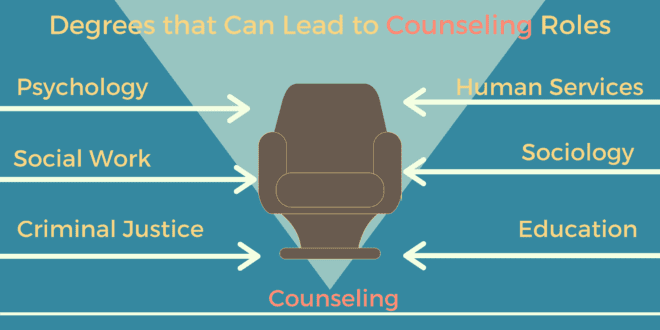
So what is a counseling degree? Many of us know some of what counselors do in their work, but many are not exposed to the academic side of counseling.
First off, there are not many degrees with “counseling” specifically in the title before the graduate level. Those seeking to enter counseling fields will often pursue related degrees at the undergraduate levels. Related degrees include criminal justice, human services, health degrees, or psychology degrees.
Associates Degrees in Counseling
For graduates looking to get in on the ground floor, some entry-level roles in counseling fields may be gained with only an associates degree. In this case, a related degree such as an associates degree in psychology or human resources may help one to get into a support role in a counseling setting. With on-the-job training, time, and potentially certifications or further education, one can move into bona fide counseling roles.
Associates degrees can typically be completed in 1.5-2 years. They often require 60 credit hours (half of a bachelor’s-level degree) including a majority of coursework in general education, and a handful of major courses. Many colleges offering associates degrees have transfer agreements with four-year colleges and universities meaning that students that complete their associates degree can then transfer to a four-year program.
Associates degrees are often a very cost effective route to either directly moving into the work force or knocking out the first two years of a bachelor’s degree. In several states and large metropolitan community college districts, tuition is even free!
Bachelor’s Degrees in Counseling
At the bachelor’s level, entry-level jobs that include some actual counseling roles can be found. For students with degrees in sociology, psychology, neuroscience, criminal justice, social work, or human services, there are many entry-level jobs related to counseling.
Some “full” counseling jobs that can be achieved with just a bachelor’s degree include jobs as a school counselor, a career counselor, a social worker (in some settings), a liaison or mediator among others.
Bachelor’s degrees typically take 3-6 years to complete, with 4 years being the traditional length of study. They almost always include a wide array of general education courses, that help to build a well rounded thinker at the collegiate level. Once general education requirements are completed, students typically take 10-12 courses in their major.
In the case of students pursuing bachelor’s degrees that can lead to counseling careers, the following are common courses:
- Social Justice
- Abnormal Psychology
- Study of Addictions
- Criminal Justice
- Human Services
- Theory of Personality
- Multi-Cultural Psychology
among others.
For those looking to work as a specialty counselor, in supervisory roles, or in clinical counseling roles, a master’s degree is needed.
Master’s Degrees in Counseling

Master’s-level degrees are also the lowest level at which you generally see degrees with “counseling” explicitly in the title.
The most common master’s-level degrees in counseling include the following:
- Master of Arts in Counseling
- Master of Science in Counseling
- Master of Education in Counseling
- Master of Psychological Counseling
A number of related degrees may also help prepare you for clinical or supervisory counseling jobs. These may include the following.
- Master of Social Work
- Master of Arts in Psychology
- Master of Science in Psychology
- Master of Education
Master’s degrees typically require 45-60 credit hours of courses at the graduate level. Some master’s programs are part of larger doctoral programs, in which students are awarded a master’s degree around a third of the way into the program. Many, however, stand-alone and offer admittance to “just” a master’s degree.
Master’s degrees typically require a thesis, which is a 100+ page research paper showing your knowledge of and ability to think critically about current research in your field. Many master’s programs also include practicums, applied projects, or internships.
Doctoral Degrees in Counseling
Finally, for those looking to perform original research, teach at the university level, or prepare for leadership roles in counseling settings, a number of doctoral degrees help lead to careers in counseling.
There are a number of doctoral degrees that can lead to careers in counseling. They largely fall into two groups: research doctorates, and professional doctorates. The main difference between these two forms of doctoral programs is that research doctorates hold the primary aim of fostering an environment in which students can perform original research in their field. This research almost always culminates in a several hundred page document called a dissertation. To obtain a research doctorate, your dissertation should be theoretically publishable, should advance your current field of research, and must be defended in front of a panel of experts.
In professional doctoral programs, coursework is more applied and the central aim is not to craft a researcher out of the doctoral candidate. Rather, professional degrees often prepare students for professional licensure exams, or to move directly into leadership roles in the workforce.
In the case of counseling, the following are research doctorates that may be pursued:
- Ph.D. in Counseling
- Ph.D. in Clinical Psychology
- Ph.D. in Counseling Psychology
- Ph.D. in Social Work
Common professional doctorates that can be pursued to proceed to clinical or leadership roles in counseling include:
- Doctor of Social Work (DSW)
- Doctor of Psychology (Psy.D.)
- Doctor of Education (Ed.D.) – sometimes considered a research doctorate
Can You Get a Counseling Degree Online?
Because counseling is such a “personal” field, many wonder if they can get a counseling degree online. The short answer is yes, you can gain counseling-related degrees at every level of study online.
The caveat to this answer is that some graduate-level counseling degrees will require you to complete in-person internships, practicums, or practical projects. Most schools, however, will facilitate your participation at a location convenient to you. If your online master’s program in counseling is based hundreds of miles away, there will almost always be the option of completing your internship right in your home town.
While online degrees have gained in popularity over recent years (almost a third of all students take some online courses), many who have not taken online courses wonder if there’s a difference in the quality of education. We can say that in our years of researching online education here at DegreeQuery, we’ve never seen a university that notes any difference on a diploma or transcript for courses taken online. Degrees taken online are identical in the eyes of the school and future employers to those taken in person.
If you’re interested in seeing our hand-selected top programs in counseling, check out our rankings of online programs below:
Online Counseling Degree Rankings
- Top 10 Online Master’s Degree Programs in Addiction/Substance Abuse Counseling
- Top 10 Online Master’s Degree Programs in Marriage & Family Counseling
- Top 20 Online Master’s Degree Programs in Mental Health Counseling
- Top 50 Degrees For Changing The World
- Top 50 Online Medical Degrees
What Jobs Can you Get With a Counseling Degree?
As you may have gleaned from the counseling degree section above, there are many, many types of counseling degrees leading to many different careers. Counselors hold roles in private practice, schools, governmental settings, the military, prisons, corporations, universities, research settings, and a host of other places.

The real answer to “what jobs can I get from a counseling degree?” comes from the answers to a few other questions. These questions include the following:
- Are there licensure requirements for the counseling role I want to perform?
- And, are there educational components to those licensure requirements?
Though the following vary by location and job type, the following can be expected:
- All clinical counseling jobs will require at least a master’s degree as well as supervised professional work experience.
- Work as school counselors generally requires graduate level work as well as supervised professional work experience.
- Some social work settings may be entered before licensure and with only a bachelor’s degree.
- Some substance abuse counseling roles may be entered a bachelor’s degree in a field related to counseling.
- Some support roles in social work or mental health settings may be entered with associates degrees.
In a broader sense, as long as you research the minimum degree required to enter into the counseling job you’re interested in, there are many jobs a counseling degree can prepare you for.
Some of the most common career specialization in counseling include the following:
- Career Counseling
- Children and Adolescent Counseling
- College Counseling
- Grief Counseling
- Mental Health Counselor
- Military Counseling
- Pastoral Counseling
- Rehabilitation Counseling
- Hospice
- Geriatrics
- Family Counseling
- Marriage Counseling
- School Counseling
- Substance Abuse Counseling
- Social Work
A wide variety of techniques may be used in therapy sessions; these often depend on how a therapist was trained. Common therapy techniques include the following:
- Art therapy
- Music therapy
- Grief counseling
- Eating disorder therapy
- Cognitive behavioural therapy
- Mindfulness-based cognitive therapy
- Interpersonal therapy
- Behavioral Activation
- Debt Counseling
- Among others
Potentially include: https://onlinecounselingprograms.com/become-a-counselor/counseling-careers/
Most Common Settings For Counseling Work
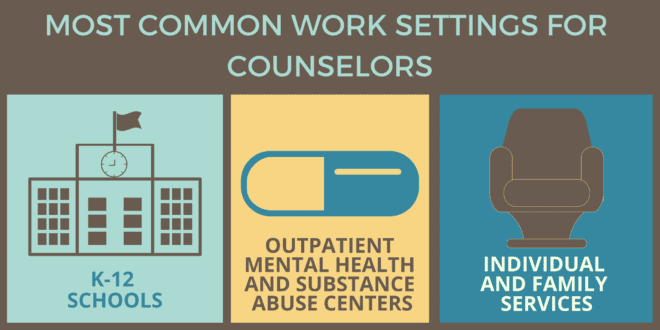
When researching the possibilities of a counseling career, you may have a particular setting you would like to work in mind. Below we’ve gathered the most comprehensive data available detailing work settings for counselors.
Work Settings for School and Career Counselors
- Elementary and secondary schools; state, local, and private: 44%
- Junior colleges, colleges, universities, and professional schools; state, local, and private: 34%
- Healthcare and social assistance: 10%
- Other educational services; state, local, and private: 4%
- Self-employed workers: 3%

Work Settings for Substance Abuse, Behavioral Disorder, and Mental Health Counselors
- Outpatient mental health and substance abuse centers: 19%
- Individual and family services: 17%
- Residential mental health and substance abuse facilities: 11%
- Hospitals; state, local, and private: 11%
- Government : 9%
Work Settings for Social Workers
- Individual and family services: 18%
- State government, excluding education and hospitals: 14%
- Ambulatory healthcare services: 13%
- Local government, excluding education and hospitals: 13%
- Hospitals; state, local, and private: 12%
Work Settings for Rehabilitation Counselors
- Community and vocational rehabilitation services: 30%
- Individual and family services: 19%
- State government, excluding education and hospitals: 14%
- Nursing and residential care facilities: 12%
- Self-employed workers: 7%
Work Settings for Marriage and Family Therapists
- Individual and family services: 28%
- Outpatient care centers: 15%
- Offices of other health practitioners: 14%
- State government, excluding education and hospitals: 13%
- Self-employed workers: 8%
What earnings can counselors expect?
As you may have guessed from the wide range of counseling positions and settings listed above, there are many answers to “how much does a counselor make?”
Counted by the number of counseling-related positions in different settings, the most common counseling roles include social workers, rehabilitation counselors, and school and career counselors. Of those three, earnings differ by level of education and setting in which they work. Generally speaking, counselors teaching at the university level, conducting research, or in private practice make the most.
Average earnings for the most common counseling positions nationwide include the following:
- Social Workers: $47,980
- School and Career Counselors: $55,410
- Rehabilitation Counselors: $34,860
Social work is the largest counseling-related field “by the numbers” and offers a range of salaries. Depending on where you live and what type of social worker you are, salaries can vary greatly.
Child, Family and School Social Workers Salaries
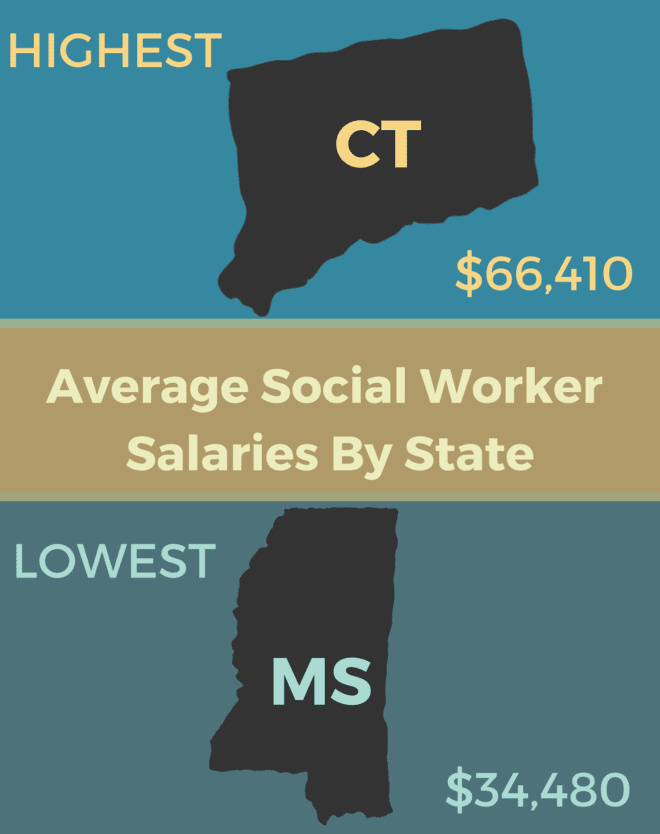
- Los Angeles, CA: $62,000
- New York, NY: $59,410
- Chicago, IL: $59,420
Healthcare Social Workers
- Los Angeles, CA: $73,970
- New York, NY: $65,590
- Chicago, IL: $56,270
Mental Health and Substance Abuse Social Workers
- Los Angeles, CA: $51,600
- New York, NY: $65,180
- Chicago, IL: $54,670
For counselors in private practice, numbers vary more but earnings can be much higher. Common private practice roles include:
- Private Practice Clinical Therapists: $150,000
- Clinical Psychologists: $72,220
How to get starting becoming a counselor today
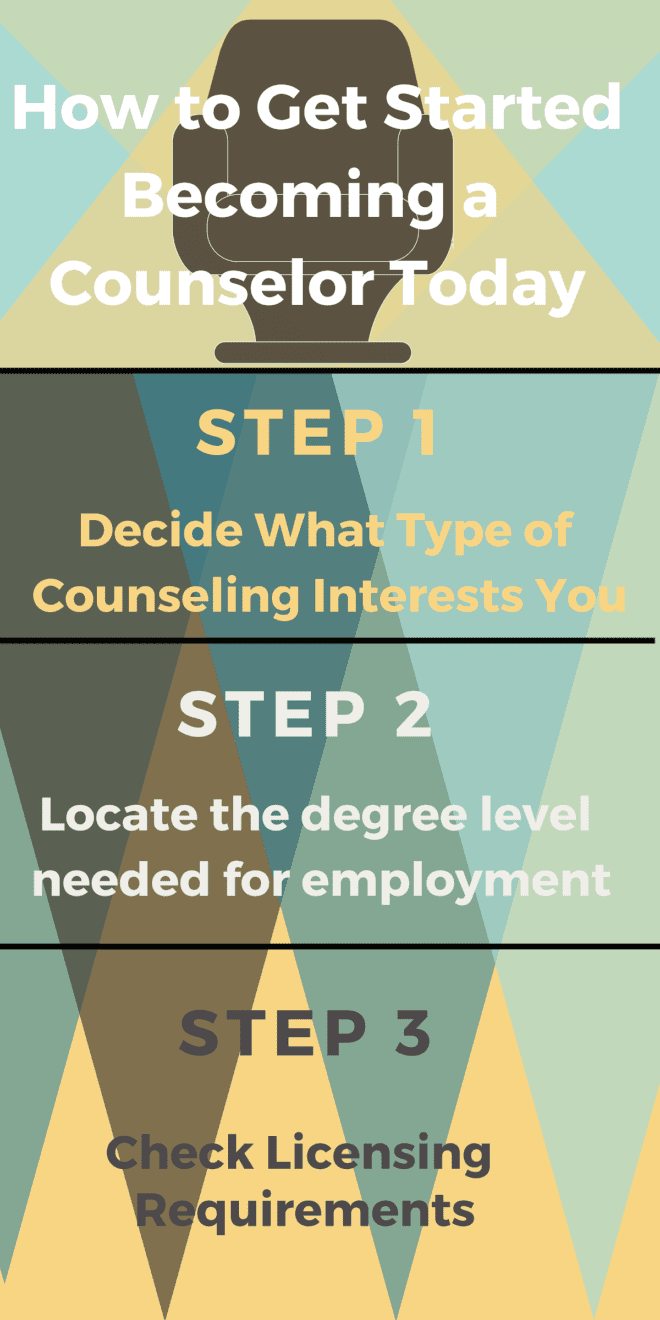
If you’ve gotten this far into our guide, you’re likely interested in seeing what options you have for obtaining a degree in counseling. A few simple steps can help you to ascertain where to begin.
First off, you’ll need the proper degree. The proper degree will depend on exactly what type of counselor you want to become, and what licensure requirements there are for that career. Below we’ve listed some of the most common counseling positions as well as the educational paths needed to get the job.
For social work positions, you may be able to begin with a bachelor’s in social work. Though to specialize you will need a master’s or more.
We’ve researched a number of the best social work degree programs here at DegreeQuery. If you think you may want to go into social work, check out our ranking of the best online master’s degrees in social work.
For public school counseling, a path similar to that of teacher licensure may be pursued. Two common ways to enter into public school counseling include obtaining a bachelor’s degree as well as a bachelor’s in education (leading to state licensure).
Bachelor’s in education degrees are technically graduate professional degrees that are often tacked on to a traditional bachelor’s course of study. This course of study involves taking a handful of courses past a conventional bachelor’s degree, completing a supervised professional internship, and passing licensure tests.
Secondarily, licensure for teaching careers (including school counseling) may be gained through non-traditional routes that allow counselors to prepare for state licensing tests while working on the job.
Those with bachelor’s degrees in psychology, human services, or related degrees may be able to perform some roles in substance abuse, mental health, and rehabilitation settings. If you’re looking to work in clinical counseling roles where you perform one-on-one counseling and a greater range of services, however, you will likely need a master’s in psychology. Licensure in individual practice types is often required.
DegreeQuery has researched a number of academic programs related to mental health and substance abuse counseling, including the following three.
- The Top Online Master’s in Mental Health Counseling
- The Top Online Master’s in Addiction and Substance Abuse Counseling
For those looking to work as private family or individual counselors a master’s in counseling or counseling psychology is necessary as well as a supervised internship and licensure exams. Individual techniques within your counseling repertoire may also offer voluntary or mandatory licensure.
